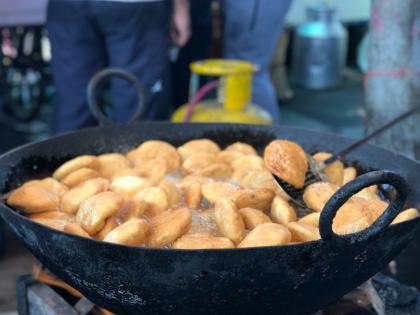NHRC Issues Notice to FSSAI Over Rampant Reuse of Cooking Oil by Restaurants and Street Food Vendors
By Lokmat Times Desk | Updated: October 24, 2025 11:12 IST2025-10-24T11:10:51+5:302025-10-24T11:12:58+5:30
The National Human Rights Commission (NHRC) has raised serious concerns about the widespread reuse of cooking oil by restaurants, ...

NHRC Issues Notice to FSSAI Over Rampant Reuse of Cooking Oil by Restaurants and Street Food Vendors
The National Human Rights Commission (NHRC) has raised serious concerns about the widespread reuse of cooking oil by restaurants, street food vendors, and other small eateries across India. It has issued a formal notice to the Food Safety and Standards Authority of India (FSSAI), pointing out that this ongoing practice poses a major risk to public health. Despite several campaigns and repeated advisories over the years, many vendors continue to heat the same oil multiple times while frying food. The rights body argued that unsafe food practices not only endanger consumers but also violate their fundamental right to health and well-being.
In a communication dated October 22, NHRC sought detailed information from FSSAI, including state-wise data and the steps taken so far to curb oil misuse, and asked for a response within two weeks. This move was prompted by a complaint from a Bhopal-based NGO, Sarthak Samudayik Vikas Evam Jan Kalyan Sanstha, which claimed that FSSAI’s initiative to discourage reuse of degraded oil has not reached small and informal food businesses. NHRC member Priyank Kanoongo stated that the issue appears to be widespread and requires urgent intervention from national and state regulators to ensure that safe and hygienic food is served.
According to the Food Safety and Standards Regulations, cooking oil is considered harmful when its Total Polar Compounds (TPC) content rises above 25 percent. TPCs are dangerous chemicals that form after oil is repeatedly heated, particularly during deep frying. As oils break down with high temperatures and contact with water or food particles, the toxicity increases. Research has shown that regular consumption of food prepared using such oil may lead to lifestyle diseases like high blood pressure, heart disorders, liver complications, Alzheimer’s disease, and even cancers. The reheating process also boosts trans-fat levels, further aggravating health risks for millions of consumers.
India is one of the world’s largest users of edible oil, with yearly consumption estimated at nearly 2,500 crore litres. A major share—around 60 percent—is used in households, while 40 percent is consumed by commercial kitchens, including hotels, restaurants, street stalls, and catering services. Due to such massive dependency on fried food, monitoring the quality of used oil becomes crucial in order to safeguard public health. Additionally, improper disposal of oil also harms the environment by polluting soil and water sources, making it essential for authorities to ensure that the entire chain—from consumption to waste collection—is effectively regulated nationwide.
FSSAI has set clear rules requiring food businesses that use more than 50 litres of oil daily to keep track of oil quality and dispose of it through licensed collectors once it becomes unsafe. The guidelines advise separating used oil in proper containers to avoid mixing and contamination. Smaller vendors are recommended to reuse oil only sparingly, ideally just once, and be alert to signs such as unusual odor, smoky fumes, excessive foaming, or dark colour. For household cooking too, the regulator suggests that leftover frying oil should be used only in gravies, not reheated again for frying, to avoid health hazards.
To address this issue, FSSAI launched the Repurpose Used Cooking Oil (RUCO) initiative in 2018, aiming to collect discarded oil and convert it into biodiesel, which supports India’s renewable energy goals. The campaign focuses on awareness, inspections, and creation of a supply network between food outlets and oil recyclers. However, the complaint received by NHRC alleges that the scheme has barely impacted smaller vendors and food stalls in many regions. While bigger restaurant chains are more likely to follow these rules, countless small businesses reportedly lack awareness or supervision, allowing unsafe oil to return to the market and endangering consumers.
Open in app